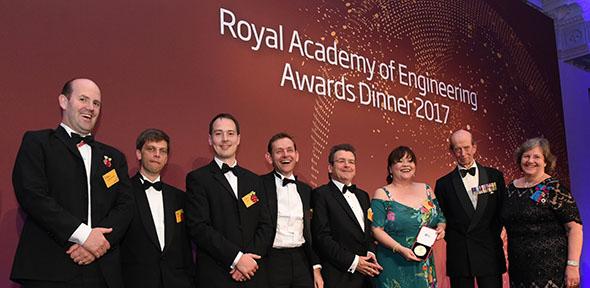
Cambridge-based microcomputer maker Raspberry Pi brings home the UK’s top engineering innovation accolade
Cambridge-based microcomputer maker Raspberry Pi has won Britain’s highest award for innovation in engineering, the Royal Academy of Engineering’s MacRobert Award.
The award, presented at a ceremony in London last night, has often tipped technologies that become “the next big thing”, among them the catalytic converter and the CT scanner.
In its commendation, the Royal Academy of Engineering said the Raspberry Pi “has revolutionised control systems and redefined the way people engage with coding”.
Accepting the award were Dr Eben Upton CBE, CEO (St John’s 1996); James Adams, COO (Clare 2014); Pete Lomas, Director of Engineering at Norcutt Technologies; Dom Cobley, Senior Principal Software Engineer; Gordon Hollingworth, Director of Engineering; and Liz Upton, Director of Communications (Lucy Cavendish 1997). They received a gold medal and £50,000 prize.
Conceived in the Computer Laboratory at the University of Cambridge as a means to spark children’s interest in coding and boost applications to study computer science, the device wildly exceeded its initial modest ambitions. Since its launch in 2012, 14 million Raspberry Pis have been sold, making it the bestselling British computer in history.
The team’s insistence on affordability (£28 for the flagship product or £4 for the Pi Zero) has allowed it to achieve its initial educational mission many times over, teaching millions of children the power of coding and preparing them for the increasingly digital workplace of the future.
“It is a great example of innovation in innovation—what started as a charitable enterprise in the Computer Lab hit a home run and is changing the world”, said Prof Andy Hopper, head of Cambridge’s Computer Laboratory.
Affectionately known as the ‘Pi’, it has inspired a new generation of makers and brought programming into classrooms in a creative and lively way. The tiny, inexpensive PC can be used as the control centre of nearly anything, from robots to video games, pet feeders or scientific experiments. It inadvertently spawned an entirely new class of computer and transformed the way engineers design industrial control systems.
Before the Pi, each industry had its own supplier of control computers. The robust and flexible Raspberry Pi swept away this fragmented market. Over half of Raspberry Pi sales are now made to industrial customers.
MacRobert Award Judge Dr Frances Saunders CB FREng said: “The Raspberry Pi team has achieved something that mainstream multinational computer companies and leading processing chip designers not only failed to do, but failed even to spot a need for. With a team of engineers numbering in the tens, not hundreds or thousands, Raspberry Pi has redefined home computing for many thousands of people across the world, even taking 1% of the global PC market. Their refusal to compromise on quality, price point or functionality has resulted in a highly innovative design that has taken the education and maker market by storm, and they have created a world-beating business in the process.”
Dr Dame Sue Ion DBE FREng FRS, Chair of the MacRobert Award judging panel, said: “What sets Raspberry Pi apart is the sheer quality of the innovation, which has allowed the computer to be used far beyond its original purpose. By blending old and new technology with innovative systems engineering and circuit board design, the team has created a computer that is cheap, robust, small and flexible. It is manufactured in the UK cheaper and at higher quality than elsewhere. Raspberry Pi’s original educational goal has actually resulted in a computer control system that can influence many different industries.”
The Raspberry Pi stands on decades of pioneering work at the University of Cambridge. The EDSAC (or electronic delay storage automatic calculator) constructed by Maurice Wilkes at the University of Cambridge Mathematical Laboratory ran its first programme in 1949, making it the world’s first fully operational and practical stored program computer.
Members of the Computer Laboratory have been involved in the creation of many successful UK IT companies such as Acorn Computers, ARM, nCipher and XenSource. Another University of Cambridge spin-out, Darktrace, was one of the other two finalists.
